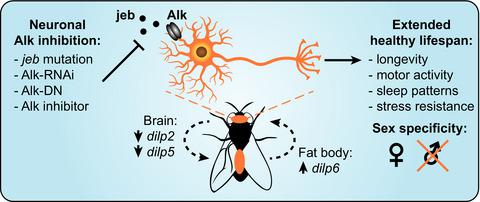当前位置:
X-MOL 学术
›
Aging Cell
›
论文详情
Our official English website, www.x-mol.net, welcomes your
feedback! (Note: you will need to create a separate account there.)
The neuronal receptor tyrosine kinase Alk is a target for longevity.
Aging Cell ( IF 8.0 ) Pub Date : 2020-04-15 , DOI: 10.1111/acel.13137 Nathaniel S Woodling 1 , Benjamin Aleyakpo 1 , Miranda Claire Dyson 1 , Lucy J Minkley 1 , Arjunan Rajasingam 1 , Adam J Dobson 1 , Kristie H C Leung 1 , Simona Pomposova 1 , Matías Fuentealba 1 , Nazif Alic 1 , Linda Partridge 1, 2
Aging Cell ( IF 8.0 ) Pub Date : 2020-04-15 , DOI: 10.1111/acel.13137 Nathaniel S Woodling 1 , Benjamin Aleyakpo 1 , Miranda Claire Dyson 1 , Lucy J Minkley 1 , Arjunan Rajasingam 1 , Adam J Dobson 1 , Kristie H C Leung 1 , Simona Pomposova 1 , Matías Fuentealba 1 , Nazif Alic 1 , Linda Partridge 1, 2
Affiliation

|
Inhibition of signalling through several receptor tyrosine kinases (RTKs), including the insulin‐like growth factor receptor and its orthologues, extends healthy lifespan in organisms from diverse evolutionary taxa. This raises the possibility that other RTKs, including those already well studied for their roles in cancer and developmental biology, could be promising targets for extending healthy lifespan. Here, we focus on anaplastic lymphoma kinase (Alk), an RTK with established roles in nervous system development and in multiple cancers, but whose effects on aging remain unclear. We find that several means of reducing Alk signalling, including mutation of its ligand jelly belly (jeb), RNAi knock‐down of Alk, or expression of dominant‐negative Alk in adult neurons, can extend healthy lifespan in female, but not male, Drosophila. Moreover, reduced Alk signalling preserves neuromuscular function with age, promotes resistance to starvation and xenobiotic stress, and improves night sleep consolidation. We find further that inhibition of Alk signalling in adult neurons modulates the expression of several insulin‐like peptides, providing a potential mechanistic link between neuronal Alk signalling and organism‐wide insulin‐like signalling. Finally, we show that TAE‐684, a small molecule inhibitor of Alk, can extend healthy lifespan in Drosophila, suggesting that the repurposing of Alk inhibitors may be a promising direction for strategies to promote healthy aging.
中文翻译:

神经元受体酪氨酸激酶 Alk 是长寿的目标。
通过几种受体酪氨酸激酶(RTK)(包括胰岛素样生长因子受体及其直系同源物)抑制信号传导,可延长来自不同进化类群的生物体的健康寿命。这提出了一种可能性,即其他 RTK,包括那些已经对其在癌症和发育生物学中的作用进行了深入研究的 RTK,可能成为延长健康寿命的有希望的目标。在这里,我们重点关注间变性淋巴瘤激酶 (Alk),这是一种在神经系统发育和多种癌症中发挥作用的 RTK,但其对衰老的影响仍不清楚。我们发现多种减少 Alk 信号传导的方法,包括突变其配体 jelly belly (jeb)、RNAi 敲低 Alk 或在成体神经元中表达显性失活 Alk,可以延长女性而非男性的健康寿命。果蝇。此外,随着年龄的增长,Alk 信号传导的减少可以保护神经肌肉功能,促进对饥饿和外源性应激的抵抗力,并改善夜间睡眠巩固。我们进一步发现,抑制成年神经元中的 Alk 信号传导可以调节几种胰岛素样肽的表达,从而在神经元 Alk 信号传导和整个生物体的胰岛素样信号传导之间提供潜在的机制联系。最后,我们证明 Alk 的小分子抑制剂 TAE-684 可以延长果蝇的健康寿命,这表明 Alk 抑制剂的重新利用可能是促进健康衰老策略的一个有希望的方向。
更新日期:2020-04-15
中文翻译:

神经元受体酪氨酸激酶 Alk 是长寿的目标。
通过几种受体酪氨酸激酶(RTK)(包括胰岛素样生长因子受体及其直系同源物)抑制信号传导,可延长来自不同进化类群的生物体的健康寿命。这提出了一种可能性,即其他 RTK,包括那些已经对其在癌症和发育生物学中的作用进行了深入研究的 RTK,可能成为延长健康寿命的有希望的目标。在这里,我们重点关注间变性淋巴瘤激酶 (Alk),这是一种在神经系统发育和多种癌症中发挥作用的 RTK,但其对衰老的影响仍不清楚。我们发现多种减少 Alk 信号传导的方法,包括突变其配体 jelly belly (jeb)、RNAi 敲低 Alk 或在成体神经元中表达显性失活 Alk,可以延长女性而非男性的健康寿命。果蝇。此外,随着年龄的增长,Alk 信号传导的减少可以保护神经肌肉功能,促进对饥饿和外源性应激的抵抗力,并改善夜间睡眠巩固。我们进一步发现,抑制成年神经元中的 Alk 信号传导可以调节几种胰岛素样肽的表达,从而在神经元 Alk 信号传导和整个生物体的胰岛素样信号传导之间提供潜在的机制联系。最后,我们证明 Alk 的小分子抑制剂 TAE-684 可以延长果蝇的健康寿命,这表明 Alk 抑制剂的重新利用可能是促进健康衰老策略的一个有希望的方向。











































 京公网安备 11010802027423号
京公网安备 11010802027423号